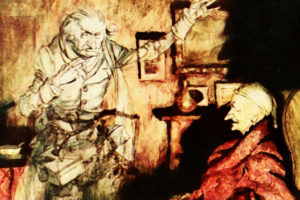As fun as flannel-gram Bible stories were, I always found it frustrating (especially when trying to teach with them) that so often, you are short the people and the objects necessary to tell the entire story. Sometimes you just don’t have enough Galilean common folk to make two crowds, or enough leapers or demonized people to do justice to some narratives.
But perhaps the most frustrating is when you are missing entire unique characters to specific stories in the Bible (because to fit the school year based childhood curriculum books you only have so many weeks to cover the life of Jesus…). For example- I never saw a flannel gram kit for telling of David’s mighty men and their one-against-millions upside down military victories. Or depictions of the Behemoth and Leviathan from Job. And how cool would it be to have a kit for the time that Paul valiantly fought wild beasts for his life in Ephesus…
Wait. Paul fighting violent and rabid animals in Ephesus?
If you are like me, you don’t remember that one from your children’s church days. Yet, in 1 Cor 15:32, in the midst of Paul’s great chapter about the centrality of the resurrection for the Christian faith, we read this verse:
”What do I gain if, humanly speaking, I fought with beasts at Ephesus? If the dead are not raised, “Let us eat and drink, for tomorrow we die.” (ESV)
What does Paul mean by “I fought with beasts at Ephesus?” Some exegetes have opted for a very literal answer: we know that Christians became the object of persecution, and were martyred in places such as the Coliseum by lions and other animals- could not Paul have encountered the same? This interpretation doesn’t seem extremely plausible, as we would expect something of this danger and uniqueness to perhaps be included in Acts (which records man of Paul’s most notable trials), or in Paul’s own ‘persecution-sufferings lists” in his Epistles. Furthermore, most of the stories of Christians and murderous animals aren’t described as “fights” with the Christians defeating their hungry opponents. Paul’s chance of survival outside of supernatural deliverance is unlikely, and we would expect to hear about this from Luke, perhaps as we did with the shipwrecked snakebite.
So, what other options are available? One very curious reading is suggested by Guy Williams, a reader at Oxford University. He suggests an apocalyptic and magical interpretation of Paul’s “beast fight.” Paul must be using the word for “fought with beasts” (eqhriomachsa) metaphorically to describe the conflict Paul did experience in Ephesus. First off, he considers the religious and cultural context of Ephesus. Historically, we know that folk religion, syncretism, magic, and mystery cults were pervasive in 1st century Asia Minor. In fact, Ephesus itself was known to be an epicenter of magic and witchcraft arts, the epicenter of the cult of Artemis. Paul’s ministry here was filled with exorcisms and power encounters (Acts 19. Note, this would also fit well with Paul’s own letter to the Ephesians where Paul says we fight “not wrestle against flesh and blood, but against the rulers, against the authorities, against the cosmic powers over this present darkness” Eph 6:12). Magical papyri contain curses and spells that “keep[] off daimons and wild animals” (GMPT IV:2170). Furthermore, qhrion (“Beast”) appears in Jewish an apocalyptic literature as a synonym for an evil spirit or demon. Additionally, evil spirits in magic were often summoned through the images and organs of wild animals. In Daniel and Revelation, we see “beasts” used to described massive spiritual opposition to God’s people. In the Dead Sea Scrolls, animal noises are listed among “the spirits of the bastards, the demons, Lilith, the howlers [and the yelpers]” (4Q5104-5). Lastly, we see the Devil is described in 1 Peter as a “roaring lion, seeking someone to devour” (1 Peter 5:8). [1]
Thus, Williams conclusion is that Paul’s “beast fight” must be referencing his conflict with evil spirits and spiritual warfare which he frequently confronted during his ministry in this occultist city.
But… is this really the best way to understand this passage? Does reading “beast”= evil spirit make sense in the other NT occurrences of the word, outside of the John’s apocalypse? And what do we make of references to Asian culture in Titus 1:12, where Paul quotes a Cretan poet who calls men “liars, evil beasts, lazy gluttons?” Or Luke 11:3, where Herod is described as a “fox? Furthermore, normal animals seem to be the referent where qhrion appears in Acts 11:26, 28:4, and 28:5, James 3:7, and Hebrews 12:20.
Altogether, I find William’s hypothesis interesting, and historically and culturally grounded. However, I don’t see how his interpretation of “beast fight” actually helps decipher the meaning of this verse in a way that makes sense in the context of all of 1 Cor 15. And additionally, there seems to be sufficient NT precedent for still reading “beast” as “physical animal” in non-apocalyptic genres, and perhaps for even understanding it as evil men from other passages.
While I wouldn’t rule beasts=evil spirits out entirely, I think it is a right step into understand the danger of Paul’s struggle as pertaining to a spiritual one, although beasts doesn’t require it to mean spirits, but could also mean opposition and struggles with men (as Paul dealt with Demetrius in Acts 19:24).
Yet ultimately, we must not lose ourselves in the trees, and fall blind to beholding the message taught from the entire forest: what joy or good is there in overcoming the opposition and enemies of God, regardless of what it is… if the resurrection is a farce? Like any matter of Christian doctrine or life, if it is not understood and approached through resurrection lenses, which take hope in the eschatological realities that we will be resurrected and glorified as our Savior himself was… what good is any of the ministry and the awesome stuff that we do? The Christian life is not about defeating each day’s beasts: it’s about identity and life (both life today, and life eternal) in the empty tomb.
[1] William’s final argument draws from church history, where he examines Origin’s Ephesians Commentary:
“Paul fought with so much sweat that he wrote to the Corinthians, ‘If I fought with beasts at Ephesus in a human manner what does it profit me if the dead do not rise?’ (! Cor. 15:32). What are those beasts? Without doubt they are those of which the psalmist speaks when he says, ‘Do not hand the soul of the one who confesses you over to the beasts’ (Ps. 73:19) and, in another passage, ‘Rebuke the wild beasts of the reed’ (Ps. 67:31). Our adversary the devil goes about like a roaring lion (cf. 1 Pet. 5:8). When he perceived that the chief city of Asia was snatched from his jaws to the teaching of Paul he gathered all the armies of his attendants and attempted to suppress him and, exalting himself beyond measure, he wanted to set that nest of his on high like an eagle (cf. Jer. 49:16). Commentary on Ephesians 635-6. Heine, The Commentaries of Origen and Jerome, p. 202. Here, Origin does not explicitly say that they are demons, but that they are evil opponents of God, who can be summoned or used by Satan in his plans.





3 Comments
Leave your reply.